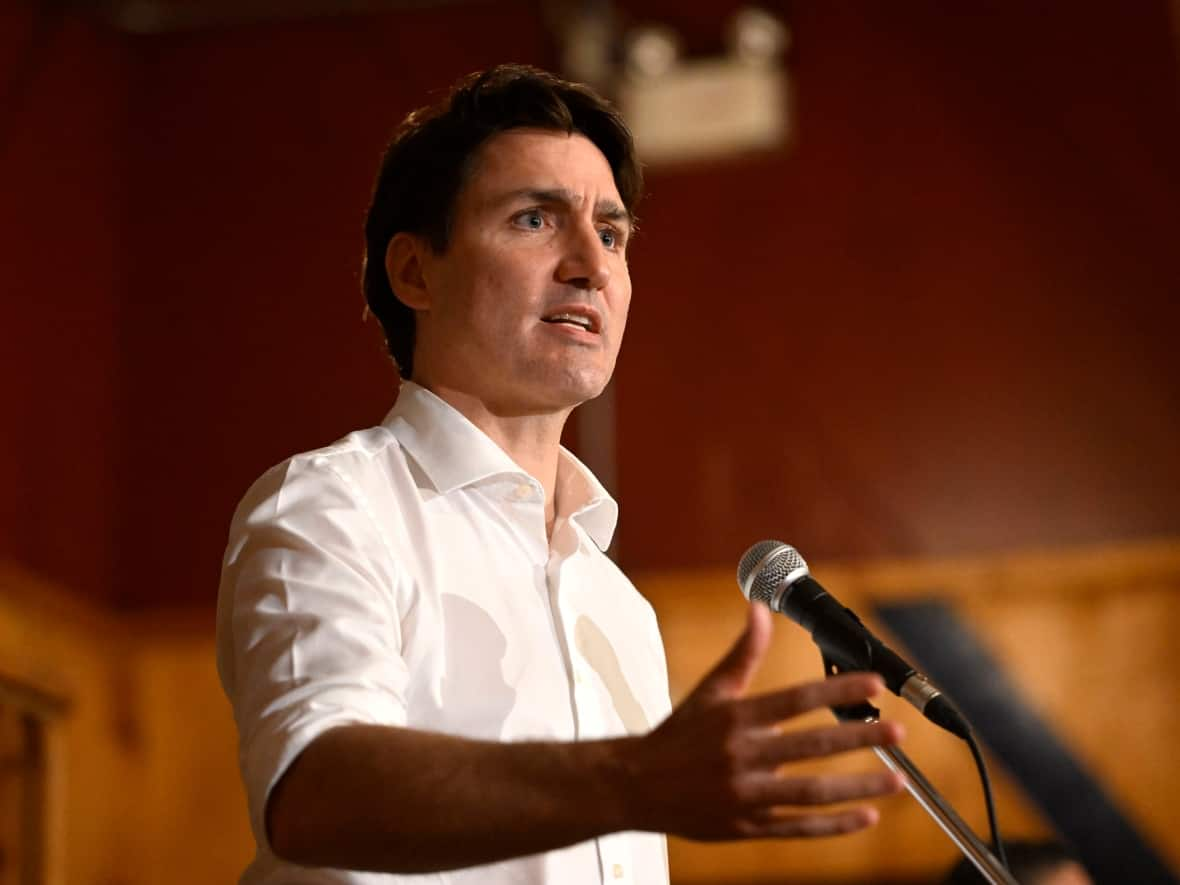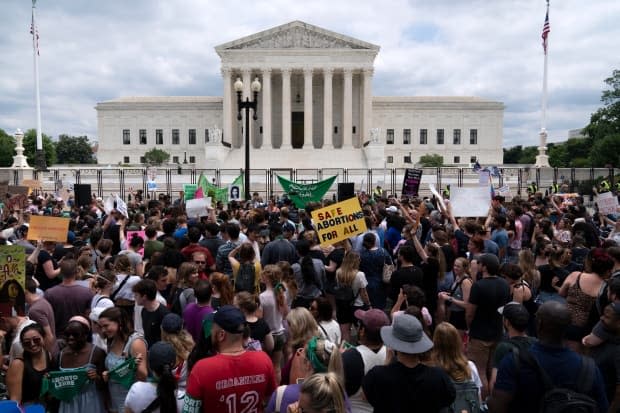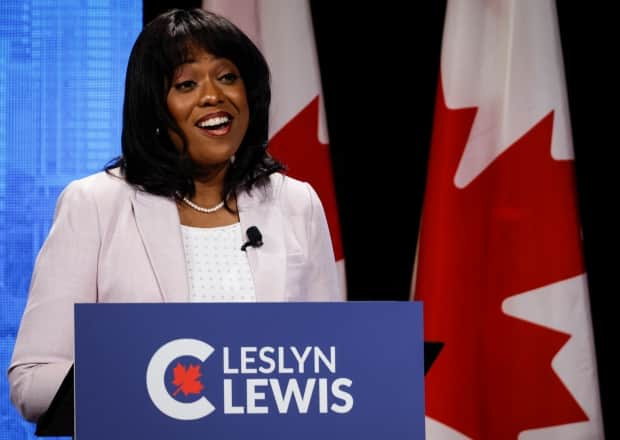Trudeau calls U.S. court decision overturning Roe v. Wade 'horrific'

Prime Minister Justin Trudeau weighed in Friday on the U.S. Supreme Court's decision to overturn decades-old jurisprudence on abortion, calling what's unfolding south of the border a "horrific" development that threatens the right of women to choose what to do with their own bodies.
"My heart goes out to the millions of American women who are now set to lose their legal right to an abortion. I can't imagine the fear and anger you are feeling right now," Trudeau said in a social media post.
Trudeau said "no government, politician, or man" should force a woman to carry out a pregnancy, reiterating that, under his Liberal government, "women in Canada know that we will always stand up for your right to choose."
Watch: 'Today is a difficult day,' Trudeau says after U.S. court decision overturning Roe v. Wade:
Deputy Prime Minister Chrystia Freeland also condemned the decision, saying Friday she had a "visceral reaction" when she first heard of the court's decision.
"I was just shocked and horrified and so worried, actually," Freeland said in an interview with CBC's Rosemary Barton Live airing Sunday.
Freeland said generations of feminists fought for abortion access in Canada, and she'll do what she can to help preserve that right.
Watch: 'Right to choice, right to an abortion is a fundamental right,' Freeland says
"I want all Canadian women and girls to hear from me that the right to choice, their right to an abortion is a fundamental right. We will not let that right be undermined in any way here in our country," she said.
The U.S. top court today overruled Roe v. Wade and Planned Parenthood of Southeastern Pa. v. Casey — two landmark decisions that allowed for legal abortions in the U.S. — ending the constitutional right to terminate a pregnancy and returning the issue to state legislatures for further action.
The majority opinion, written by Samuel Alito, a Republican nominee, claims the 1973 Roe decision was constitutionally dubious and "egregiously wrong from the start" because its reasoning was "exceptionally weak."

Alito said that decision, which essentially found that the right to privacy extended to reproductive choices like an abortion, has had "damaging consequences" by dividing a nation into anti-abortion and pro-choice factions and robbing state officials of the power to regulate the practice.
As in the U.S., the issue of abortion has been the subject of much political debate in Canada — perhaps nowhere more so than within the Conservative Party of Canada.
Conservative leadership candidates divided on abortion
One of the party's leadership contenders, MP Leslyn Lewis, has released a policy platform promising what she calls "pro-life" policies if elected, including a ban on "sex-selective" abortions, criminal penalties for "coerced" abortions, increased funding for pregnancy centres (organizations that persuade pregnant women against having abortions) and an end to federal funding for abortion services overseas.
In a letter to supporters Friday, Lewis said Conservatives shouldn't be afraid to discuss anti-abortion policies.
She said, while the Liberal Party has taken a hard line on abortion by barring anti-abortion candidates from running, the Conservatives are a "big-tent party of unity" that should accommodate social conservatives and their views.
"We can try what our party has done in the last several elections and run from the issue, letting the Liberals set the agenda, or we can be the voice of unity and take control of the conversation," she said.

Another leadership candidate, MP Pierre Poilievre, has had a more complicated relationship with the social conservative wing of the party.
In the past, Poilievre supported initiatives such as Motion 312 — which would have prompted a review of when a child becomes a human being in Canadian law — and a private member's bill that would have stiffened criminal penalties for the murder of an unborn child.
But, in this leadership election, Poilievre has signalled he's not interested in legislating against abortion, if elected.
During the party's French-language leadership debate last month, Poilievre said he is "pro-choice."
A spokesperson for the campaign also told CBC News Friday that "a Poilievre government will not introduce or pass any laws restricting abortion."
The other two leading candidates for the party's top job, Brampton, Ont. Mayor Patrick Brown and former Quebec premier Jean Charest, have said they are solidly pro-choice.
In a social media post, Charest said he was "disturbed" that Roe v. Wade has been overturned.
"While I recognize there are strongly held beliefs on this issue, reproductive rights in Canada are non-negotiable," he said.
Singh on abortion access in Canada
In a statement, NDP Leader Jagmeet Singh said "women will die as a result of this devastating decision," while reiterating that these "dangerous policies" must not be allowed to take hold in Canada.
He said Trudeau and the federal Liberals "say the right things" about abortion access in Canada but "that isn't enough" and there's more to do on the issue.
"Women in many parts of the country, particularly in rural communities, have to drive hundreds of miles to access the care they need. This is wrong. It has never been more important for the Liberals to make the much-needed and long-overdue investments in women's health care services," Singh said.
Watch: 'It's a setback,' Joly says after U.S. Supreme Court overturns Roe v. Wade:
Singh said, with abortion access soon to be limited in some U.S. states, including in states that border Canada, there could be a run on abortion providers here as American women flee to friendlier jurisdictions for the medical procedure. He said Canada should be prepared.
In recent years, numerous Republican-led states have passed abortion restrictions and so-called "trigger bans" designed to limit the practice as soon as Roe is overturned. That means, as of today's decision, abortion is illegal or restricted in 13 states with other states expected to follow through with similar bans in the coming weeks.
Facing limited access, some women may cross state lines to get an abortion in places where it remains legal or cross the border into this country where there isn't any federal law on abortion.
Families Minister Karina Gould has said U.S. women will be able to obtain an abortion in Canada. Public Safety Minister Marco Mendicino has also instructed Canadian Border Services Agency (CBSA) officials to allow free passage to U.S. women seeking abortion.
However, questions remain about how viable an option this is for the many poor women who seek to terminate a pregnancy each year. Fewer than 40 per cent of Americans hold a passport, a travel document necessary to cross the border into Canada for any purpose.


